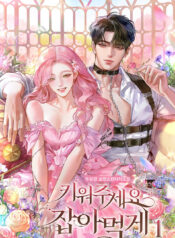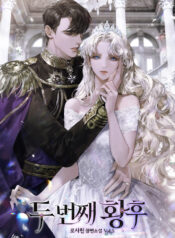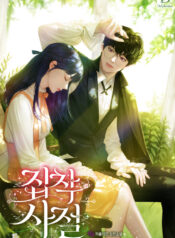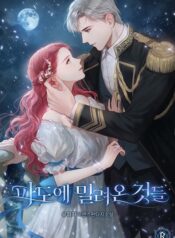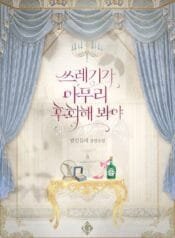Amelia had been suffering from a fever for nearly a week.
Helen and Betty were naturally alarmed when they found Amelia collapsed on the foyer floor, her dress completely soaked. While Betty drew a hot bath and tended to Amelia, Helen, puzzled by the unfamiliar robe, shook off the mud from Amelia’s clothes.
“The daffodils have withered.” That was all Amelia said before falling into a deep sleep, as if she had taken a sedative, when Betty laid her on the bed. Helen, with a worried expression, muttered that the young lady must be missing the daffodils from the Brienne Garden.
“My Lady.”
“…”
“My Lady, it’s time to eat.”
Amelia, who had dozed off sitting upright in bed, opened her eyes at Betty’s words. A tray with a bowl of milk porridge and a dish of pudding was placed on her lap.
“…Thank you.”
“Your fever has subsided.”
Betty said this as she placed a hand on Amelia’s forehead, who had started to eat. While Betty went in and out of the room, replacing the water in the basin and fetching fresh towels, Amelia slowly ate her meal. Her mouth still felt dry, but today she wanted to gather her strength and go outside. Besides, she was quite hungry.
While Amelia had been ill, spring had arrived in Olstein, chasing away winter. Gazing absentmindedly at the sunlight streaming into the room, the blurry events of the past, like a dream, began to take shape again. It was only recently that Amelia realized those feelings were melancholia.
As Amelia alternated between sleep and waking, the scenery in her room gradually changed. Helen replaced the thick, blanket-like curtains with fresh linen ones. Betty rotated several vases of varying shapes, often filling them with flowers like crocuses, though daffodils were the most dominant.
Betty explained that, in spring, every room in the imperial palace was decorated with flowers. Particularly along the promenade behind the castle, where a lake lay, daffodils bloomed so profusely that the maids would compete to thin them out and arrange them in vases.
Even while bedridden, Amelia found herself curious about the scenery by the lake. She also felt a pang of sorrow remembering the daffodils Philip had given her, now wilted and lifeless. She wondered how they would have looked in full bloom.
“Did you enjoy your meal?”
Betty approached Amelia, who had finished her meal, and asked. Amelia nodded, noticing the item Betty held in her hands.
“What’s that?”
“It’s a parasol. Helen made it.”
Betty added that she had helped as well, handing it to Amelia. Amelia carefully unfolded the parasol’s frame. It was an extravagant piece, made of soft cream silk with hand-stitched lace.
“Oh my.”
“Isn’t it beautiful?”
The lace, crafted with Helen’s skillful embroidery, featured a remarkably detailed pattern. It depicted blooming roses on branches spreading out in a circular design. Beneath the parasol’s shade, which seemed made just for Amelia, one could enjoy the shadow of a blossoming tree in the spring sunlight.
“…I want to go outside.”
Amelia spoke while gently spinning the parasol’s handle. Betty nodded.
“It’s time you got up.”
With that, Betty moved to the wardrobe and began selecting a dress. Amelia folded the parasol and reflected on the fleeting sadness she had just recalled.
If only emotions could be woven like lace, their forms might at least be preserved. Even the most brilliant feelings fade and change so quickly. Philip’s memory still lingered within Amelia, but now the wounds had become small scars, waiting to heal.
‘I’ll stay here.’
Amelia resolved to leave behind the pain she could not control and hold onto only that promise.
—
Beyond Olstein Castle, following the promenade that wrapped around the large lake, a carriage ride would eventually lead to the secluded palace where the late imperial consort had once lived.
During her healthier days, she enjoyed launching small boats on the lake and feeding the waterfowl, so the emperor had ordered the planting of numerous flowers along the lake and the forest trail intersecting the promenade. Because of this, Josef did not particularly like the lake.
The emperor had yet to decide what to do with the secluded palace, and the ministers were not pressing him for a decision. While Duke Mieschko tried to persuade them otherwise, most supported the emperor and showed no inclination to act swiftly.
“The location would be ideal for a shooting range, Your Majesty,” said the Knight Commander, who had just returned from inspecting the palace grounds with Josef.
“Commander, you could also build stables or a pigsty.”
“Pardon?”
“Anything would be better than that palace.”
Josef replied coldly. Though uninhabited, the sight of ongoing pruning and flower planting irritated him. It seemed the emperor wanted to stroll through the garden alone, reminiscing about his late consort.
“Go on.”
At Josef’s words, the knights accompanying the commander looked delighted as they quickly dispersed toward the promenade near the lake.
“Wasn’t this supposed to be training time?”
Josef asked, puzzled. The Knight Commander chuckled.
“Today is an exception. The younger ones have trouble focusing whenever spring arrives.”
When the ice on the lake melts and flowers bloom, ladies in lighter attire take their walks. The young knights, eager to catch a glimpse or strike up a conversation, swing their spears with discontented faces. Unable to bear it, the Knight Commander occasionally granted them a break.
The lake, reflecting the sky’s blue, was now surrounded by blooming yellow daffodils. Ladies in colorful dresses, as if competing with the flowers, strolled along the promenade. Some sat by the lakeside, watching the swans.
“Spring truly has come.”
Though still cool compared to other parts of the continent, Olstein now considered winter a season of the past. The Knight Commander, who had buttoned his uniform up to the collar, wiped his brow, seemingly feeling the warmth.
“…”
Josef, showing no interest in spring, stood still under the glaring sunlight, wearing an expression that suggested he didn’t care whether spring had arrived or not. The Knight Commander seemed curious about why Josef, who disliked mingling with others, hadn’t left yet.
“I greet Your Highness, the Crown Prince. Oh my, the Knight Commander is here as well.”
“Oh, Madam, it’s an honor to meet you here,” replied the Knight Commander.
The middle-aged woman, appearing about the same age as the Knight Commander, was Lady Romberry, who often acted as a chaperone for high-ranking noble ladies. She seemed familiar with the Knight Commander’s wife, exchanging pleasantries and light conversation.
“This year, the knights’ advances have been so blatant, making strolls quite entertaining,” Lady Romberry remarked playfully, glancing at the knights loitering near the promenade.
“Goodness,” the Knight Commander coughed awkwardly, his unease seemingly amusing to Lady Romberry, whose eyes sparkled as she continued,
“Besides, there’s a young lady from Brienne I’ve never seen before.”
Josef was already aware of that; he had been observing her for some time.
“You mean the hostage from the Governor’s territory. I’ve only heard her name, but I haven’t seen her in person.”
“Really? That’s her, over there,” Lady Romberry said, extending her finger slightly to point at Amelia, who was walking with her maid on the opposite side of the lake.
Amelia, dressed in a pale lemon-colored gown, held a parasol. She would pause occasionally to admire the daffodils or watch the swans gliding across the lake before resuming her stroll.
“I saw her up close, and she truly has the air of someone from Brienne. The lace on her parasol was extraordinary. I doubt even the finest ateliers could replicate such craftsmanship,” Lady Romberry said with a note of envy.
Josef silently observed Amelia. She had yet to notice him. As Amelia walked along the semicircular path around the lake, the distance between them gradually shrank.
After a short walk, a knight who had been standing under a tree approached her hesitantly. Amelia halted in her tracks, and just as the knight leaned forward to speak, her maid stepped forward, blocking his advance.
“My, my,” Lady Romberry chuckled.
“How typical,” added the Knight Commander, clicking his tongue in amusement.
The scene before them—a knight being dismissed before he could even flirt with a lady—was a familiar one.
Amelia tilted her parasol slightly, as if to shield her face from the knight’s view. The graceful, butterfly-like motion made her appear more aloof than ever. Her expression seemed calm, yet her wariness was unmistakable—a sentiment only someone like Josef, who had encountered it before, could discern.
When her maid spoke to her, Amelia smiled again, slightly turning her head to avoid the sunlight. In that moment, her eyes met Josef’s. Though they were still too far apart to call out to each other, the distance was close enough to exchange meaningful glances.
Amelia neither stiffened nor averted her gaze. She looked at Josef for a moment, then tilted her head slightly before lifting it again.
Josef read much in those blue eyes. Amelia remembered. She was recalling the rainy day when Josef had escorted her back to the estate, and her subtle gesture was an acknowledgment of her gratitude for that act.
“…”
After a brief exchange of glances, Amelia followed her maid’s lead, moving away from the lakeside. Just then, a nearby swan suddenly flapped its wings, sending water droplets splashing at her feet.
Startled, the maid took a step back, but Amelia caught her, laughing at the situation. Josef, momentarily dazed, quickly collected himself.
He had never understood the antics of noble scions or battle-hardened knights, who would do anything to capture a lady’s fleeting attention. That was, until Amelia had directed her gaze at him.
Suddenly, the shimmering surface of the lake seemed to sparkle. The trees lining the path appeared more vibrant, and even the petals swayed with the slightest breeze.
It was the warmth of spring. Josef had thought of spring as merely the season following winter, but now he truly felt its warmth for the first time.
Amelia was beautiful, and her presence captivated him in a way that was almost frustrating. Josef tried attaching various descriptions to her: a butterfly in bloom, a daffodil guarding the lake.
Yet, no adjective seemed sufficient to encapsulate the emotions she stirred within him. Josef stood silently, wondering what name he should give to this feeling.

